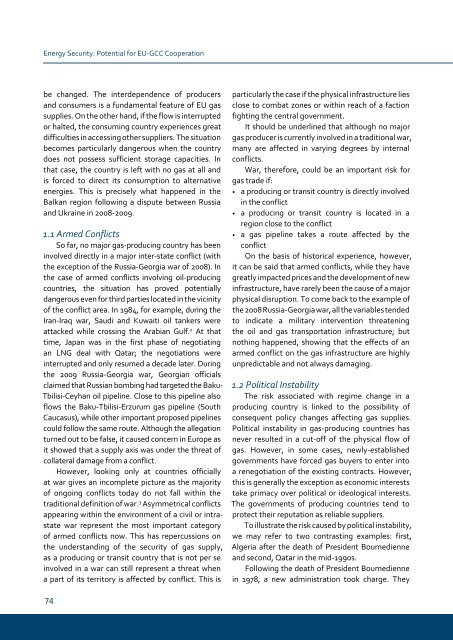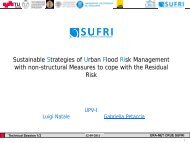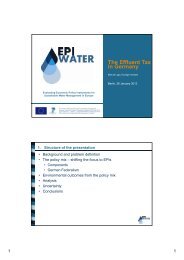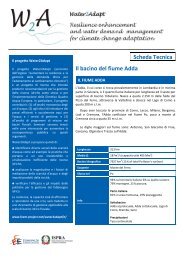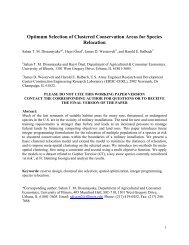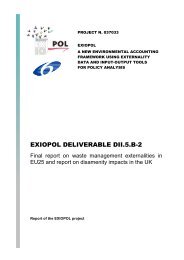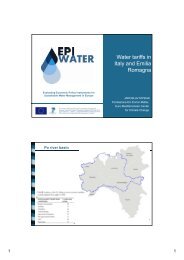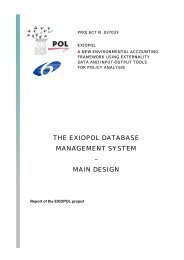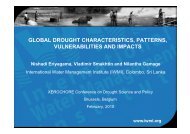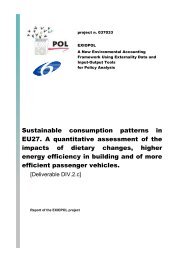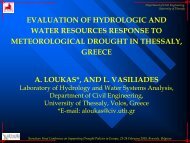Gulf and European Energy Supply Security - Feem-project.net
Gulf and European Energy Supply Security - Feem-project.net
Gulf and European Energy Supply Security - Feem-project.net
You also want an ePaper? Increase the reach of your titles
YUMPU automatically turns print PDFs into web optimized ePapers that Google loves.
<strong>Energy</strong> <strong>Security</strong>: Potential for EU-GCC Cooperation<br />
be changed. The interdependence of producers<br />
<strong>and</strong> consumers is a fundamental feature of EU gas<br />
supplies. On the other h<strong>and</strong>, if the flow is interrupted<br />
or halted, the consuming country experiences great<br />
difficulties in accessing other suppliers. The situation<br />
becomes particularly dangerous when the country<br />
does not possess sufficient storage capacities. In<br />
that case, the country is left with no gas at all <strong>and</strong><br />
is forced to direct its consumption to alternative<br />
energies. This is precisely what happened in the<br />
Balkan region following a dispute between Russia<br />
<strong>and</strong> Ukraine in 2008-2009.<br />
1.1 Armed Conflicts<br />
So far, no major gas-producing country has been<br />
involved directly in a major inter-state conflict (with<br />
the exception of the Russia-Georgia war of 2008). In<br />
the case of armed conflicts involving oil-producing<br />
countries, the situation has proved potentially<br />
dangerous even for third parties located in the vicinity<br />
of the conflict area. In 1984, for example, during the<br />
Iran-Iraq war, Saudi <strong>and</strong> Kuwaiti oil tankers were<br />
attacked while crossing the Arabian <strong>Gulf</strong>. 2 At that<br />
time, Japan was in the first phase of negotiating<br />
an LNG deal with Qatar; the negotiations were<br />
interrupted <strong>and</strong> only resumed a decade later. During<br />
the 2009 Russia-Georgia war, Georgian officials<br />
claimed that Russian bombing had targeted the Baku-<br />
Tbilisi-Ceyhan oil pipeline. Close to this pipeline also<br />
flows the Baku-Tbilisi-Erzurum gas pipeline (South<br />
Caucasus), while other important proposed pipelines<br />
could follow the same route. Although the allegation<br />
turned out to be false, it caused concern in Europe as<br />
it showed that a supply axis was under the threat of<br />
collateral damage from a conflict.<br />
However, looking only at countries officially<br />
at war gives an incomplete picture as the majority<br />
of ongoing conflicts today do not fall within the<br />
traditional definition of war. 3 Asymmetrical conflicts<br />
appearing within the environment of a civil or intrastate<br />
war represent the most important category<br />
of armed conflicts now. This has repercussions on<br />
the underst<strong>and</strong>ing of the security of gas supply,<br />
as a producing or transit country that is not per se<br />
involved in a war can still represent a threat when<br />
a part of its territory is affected by conflict. This is<br />
4<br />
particularly the case if the physical infrastructure lies<br />
close to combat zones or within reach of a faction<br />
fighting the central government.<br />
It should be underlined that although no major<br />
gas producer is currently involved in a traditional war,<br />
many are affected in varying degrees by internal<br />
conflicts.<br />
War, therefore, could be an important risk for<br />
gas trade if:<br />
• a producing or transit country is directly involved<br />
in the conflict<br />
• a producing or transit country is located in a<br />
region close to the conflict<br />
•<br />
a gas pipeline takes a route affected by the<br />
conflict<br />
On the basis of historical experience, however,<br />
it can be said that armed conflicts, while they have<br />
greatly impacted prices <strong>and</strong> the development of new<br />
infrastructure, have rarely been the cause of a major<br />
physical disruption. To come back to the example of<br />
the 2008 Russia-Georgia war, all the variables tended<br />
to indicate a military intervention threatening<br />
the oil <strong>and</strong> gas transportation infrastructure; but<br />
nothing happened, showing that the effects of an<br />
armed conflict on the gas infrastructure are highly<br />
unpredictable <strong>and</strong> not always damaging.<br />
1.2 Political Instability<br />
The risk associated with regime change in a<br />
producing country is linked to the possibility of<br />
consequent policy changes affecting gas supplies.<br />
Political instability in gas-producing countries has<br />
never resulted in a cut-off of the physical flow of<br />
gas. However, in some cases, newly-established<br />
governments have forced gas buyers to enter into<br />
a renegotiation of the existing contracts. However,<br />
this is generally the exception as economic interests<br />
take primacy over political or ideological interests.<br />
The governments of producing countries tend to<br />
protect their reputation as reliable suppliers.<br />
To illustrate the risk caused by political instability,<br />
we may refer to two contrasting examples: first,<br />
Algeria after the death of President Boumedienne<br />
<strong>and</strong> second, Qatar in the mid-1990s.<br />
Following the death of President Boumedienne<br />
in 1978, a new administration took charge. They


